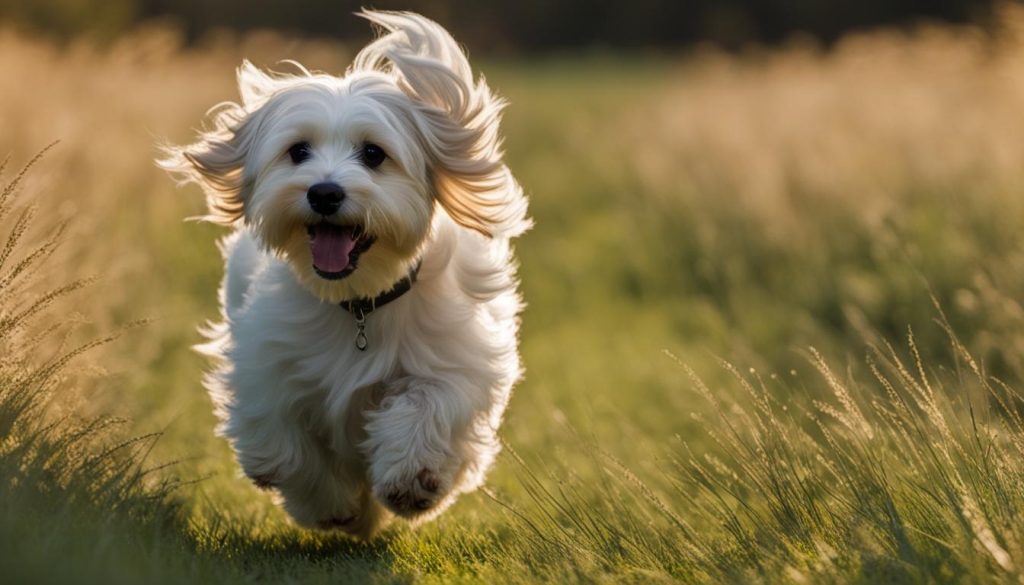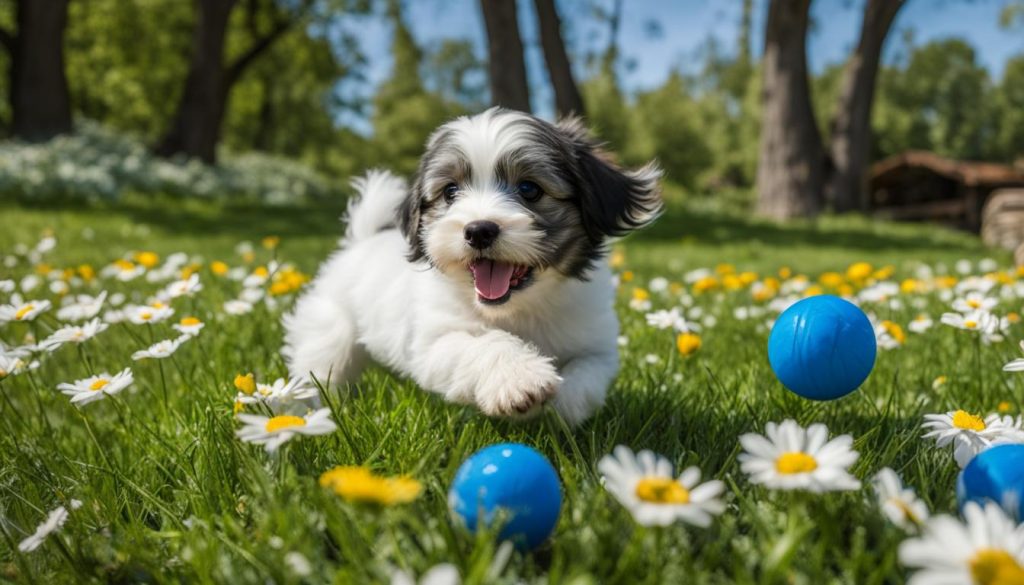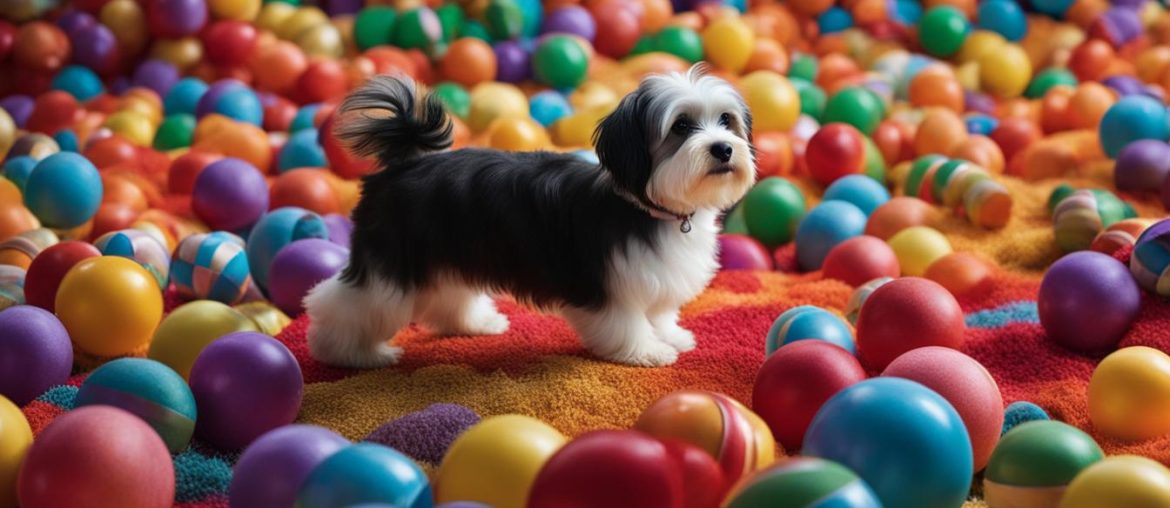As a professional copywriting journalist, I have delved into the fascinating world of Havanese dogs, renowned for their unique personality traits. The Havanese breed is known for its distinctive temperament, characteristics, and behavior, making it a popular choice among dog lovers.
Key Takeaways:
- Havanese dogs have a playful and affectionate nature.
- They enjoy learning tricks and participating in games with their owners.
- Proper socialization is crucial to prevent timidity with strangers.
- Havanese are generally good with other pets if properly introduced.
- They make excellent companions and have a lifespan of 10 to 15 years.
Havanese Attributes and Care

When considering a Havanese as a pet, it is important to understand their attributes and care requirements. This small breed typically weighs between 7 and 13 pounds and stands at a height range of 8 1/2 to 11 1/2 inches at the shoulder. Their medium length coat comes in various colors and combinations, including white.
In terms of exercise, Havanese require 20-40 minutes of physical activity per day. They have a high energy level and enjoy activities such as walks and playtime. With a lifespan of 10 to 15 years, it is essential to provide them with regular exercise to maintain their overall well-being.
Grooming is another crucial aspect of Havanese care. They have moderate grooming needs and require regular brushing and combing three or more times a week to prevent matting. Trimming is not necessary for this breed.
| Attribute | Description |
|---|---|
| Size and Weight | Small breed weighing 7-13 pounds |
| Height | 8 1/2 to 11 1/2 inches at the shoulder |
| Coat | Medium length, various colors and combinations |
| Exercise | Requires 20-40 minutes of daily physical activity |
| Grooming | Regular brushing and combing required to prevent matting |
Alongside their physical needs, Havanese also have social requirements. They thrive on interaction with their owners and enjoy being part of the family. These affectionate dogs are known for their friendly and playful nature. They do well in homes where they receive ample attention and love.
Providing proper care and meeting their attributes is essential for ensuring the happiness and well-being of your Havanese companion.
Havanese Social Needs
Havanese are highly social animals and require regular interaction with people. They are happiest when included in family activities and enjoy being the center of attention. This breed does not do well when left alone for long periods and can develop separation anxiety. It is important to provide them with ample socialization and mental stimulation to prevent boredom and destructive behavior.
Havanese Size and Longevity
Due to their small size, Havanese are well-suited for apartment living. They do not require a large yard but still need daily exercise and playtime to meet their activity needs. With a lifespan of 10 to 15 years, Havanese can be a long-term companion, bringing joy and love to their owners for many years.
Havanese Personality Traits

The Havanese breed is known for its unique and endearing personality traits. They are affectionate companions who form strong bonds with their owners, making them a popular choice for families and individuals seeking a loyal and loving pet. Havanese dogs are naturally affectionate and enjoy being close to their humans, often seeking out physical contact through cuddling and snuggling.
Another prominent personality trait of Havanese dogs is their playful nature. They have a lively and enthusiastic demeanor, always ready for a game or a fun activity. Whether it’s chasing a ball, playing with toys, or participating in interactive training sessions, Havanese dogs are known for their playful antics that can keep their owners entertained for hours. Their playful nature makes them an excellent choice for families with children or individuals looking for an active and engaging companion.
In addition to being affectionate and playful, Havanese dogs are also highly intelligent and trainable. They possess a keen ability to learn and excel in obedience training, tricks, and agility exercises. Their intelligence combined with their eagerness to please makes them quick learners and adaptable to various training methods. Positive reinforcement techniques and consistent training sessions can bring out the best in Havanese dogs, allowing them to showcase their intelligence and learn new skills.
Socialization is an essential aspect of raising a Havanese dog. While they are naturally friendly and sociable, early and ongoing socialization is necessary to ensure they grow up to be well-rounded and confident individuals. Adequate exposure to different people, animals, and environments from a young age helps prevent timidity or shyness. Proper socialization allows Havanese dogs to interact positively with strangers, other pets, and various situations, making them pleasant companions in any setting.
Overall, the combination of affection, playfulness, intelligence, and sociability makes the Havanese breed an ideal choice for those seeking a loving and interactive companion. Their unique personality traits make them a joy to be around, bringing happiness and companionship to their owners for many years to come.
Havanese Behavior Expectations
When considering adding a Havanese to your family, it’s important to have a clear understanding of their behavior expectations. While Havanese can make good watchdogs due to their alert nature, their small size makes them ineffective as guard dogs.
One behavior that potential owners should be aware of is the tendency for Havanese to bark excessively if not properly trained. This is a behavior that can be addressed through consistent training and positive reinforcement techniques. Training plays a crucial role in shaping their behavior and ensuring they are well-behaved members of the family.
Another behavior concern to address is separation anxiety. Havanese are social dogs that thrive on interaction with their owners. When left alone for long periods, they can develop separation anxiety, which can manifest as destructive behavior. Providing ample mental stimulation, engaging in regular training, and gradually acclimating them to being alone can help alleviate separation anxiety.
Socializing and Training
Proper socialization is key to raising a well-rounded Havanese. Early socialization with different people, animals, and environments can help prevent timidity and fearfulness towards strangers. Positive experiences during socialization can contribute to a confident, friendly, and well-behaved adult dog.
Training Havanese is generally a positive experience as they are intelligent and eager to please. They excel in learning tricks and can participate in various dog sports and competitions. Consistency, positive reinforcement, and reward-based training methods are recommended to achieve the best results. It’s important to establish clear boundaries and provide mental stimulation to keep them mentally and physically engaged.
By understanding and addressing these behavior expectations, you can ensure a harmonious and fulfilling relationship with your Havanese. Consistent training, socialization, and providing them with the love and attention they need will help them thrive as companions and valued members of your family.
Havanese History and Origin

The history of the Havanese breed can be traced back to Cuba. They are believed to have descended from the Bichon Tenerife, a small dog brought to Cuba by Spanish colonists in the 1500s. Over time, the breed became popular among the Cuban upper class and European nobility in the 18th century.
During the Cuban Revolution, some Cubans who fled to the United States brought their beloved Havanese dogs with them. These dogs became the foundation stock for the breed in the US. Today, Havanese dogs are cherished for their playful and affectionate nature, as well as their intelligence and adaptability.
This charming breed’s history and origins make them a unique and fascinating companion. Their Cuban heritage has influenced their personality and traits, making them a delightful addition to any family.
Havanese Origin Story
Unlike many other dog breeds, the Havanese has a rich history that can be directly traced back to Cuba. The breed’s ancestors, the Bichon Tenerife, were initially brought to Cuba by Spanish colonists during the 16th century. Over time, these little dogs became beloved companions to the Cuban upper class and European nobility.
However, the Havanese’s journey didn’t stop there. During the Cuban Revolution in the late 1950s, some Cubans fled to the United States, taking their precious Havanese dogs with them. These dogs played a vital role in establishing the breed in the US, becoming the foundation stock for Havanese breeding programs.
Today, the Havanese is treasured for its friendly and affectionate nature, making it an excellent choice for families and individuals alike. Its unique history and origin story make the Havanese a cherished and special breed.
Havanese Grooming and Maintenance

Grooming plays an important role in maintaining the health and appearance of Havanese dogs. Their medium-length coat requires regular brushing and maintenance to keep it mat-free and healthy. To prevent matting, it is recommended to brush and comb your Havanese three or more times a week. Regular brushing not only removes loose hair and prevents tangles but also stimulates the skin and promotes good circulation.
Havanese have a unique coat texture that is soft and silky, but it can easily become tangled and matted if not properly cared for. To keep the coat mat-free, start by gently combing through it to remove any knots or tangles. Use a slicker brush or a comb with widely spaced teeth to brush through the entire coat, paying attention to areas prone to matting, such as behind the ears and under the armpits.
Trimming is not necessary for Havanese, as their coat grows continuously and doesn’t shed like other breeds. However, it is important to keep the hair around their eyes, ears, and paws trimmed to prevent irritation and infections. Regularly check and clean their ears to prevent wax buildup and infections. Additionally, maintaining good dental hygiene is crucial for their overall health. Regular brushing and professional dental cleanings are recommended to prevent dental diseases.
| Grooming Needs | Frequency |
|---|---|
| Brushing and Combing | Three or more times a week |
| Eye, Ear, and Paw Trimming | As needed |
| Ear Cleaning | Weekly |
| Dental Care | Regular brushing and professional cleanings |
Grooming Tips:
- Use a slicker brush or a comb with widely spaced teeth to prevent discomfort and hair breakage.
- When trimming the hair around the eyes, be cautious to avoid accidental injury.
- Regularly check and clean the ears to prevent wax buildup and infections.
- Introduce grooming routines early to help your Havanese become accustomed to the process.
- Monitor their coat for any signs of skin issues or parasites and consult a veterinarian if necessary.
“Regular grooming is essential for maintaining the health and appearance of Havanese dogs. By following a regular grooming routine and addressing their specific needs, you can keep your Havanese’s coat mat-free and healthy, ensuring a happy and comfortable companion.”
Havanese Living Requirements

When considering a Havanese as a pet, it’s important to understand their living requirements. Despite being a small breed, Havanese dogs are energetic and require regular exercise to stay happy and healthy. While they don’t need a large yard, they do enjoy frequent walks and playtime to meet their activity needs. Havanese small size makes them well-suited for apartment living, as long as they receive enough physical and mental stimulation.
One aspect to be mindful of is Havanese separation anxiety. These dogs form strong bonds with their owners and can become anxious when left alone for long periods. To prevent this, it’s crucial to provide them with ample interaction and mental stimulation. Engaging in interactive play, puzzle toys, and keeping a consistent routine can help alleviate separation anxiety and prevent boredom-induced destructive behaviors.
Creating a Havanese-friendly living space
To ensure a content and comfortable environment for your Havanese, consider the following guidelines:
- Provide a cozy and designated space for your Havanese to rest and relax.
- Secure your living area to prevent any potential hazards, especially for curious and adventurous Havanese.
- Keep their food and water bowls in a quiet and accessible area.
- Make sure to have plenty of engaging toys and interactive games to keep them mentally stimulated.
- Establish a consistent daily routine, including regular feeding times and exercise sessions.
By following these guidelines and understanding their living requirements, you can create a happy and suitable living environment for your beloved Havanese companion.
Havanese Health Concerns
When considering the Havanese breed, it’s important to be aware of potential health concerns that may arise. While Havanese are generally a healthy and hardy breed, there are certain genetic conditions that can affect them throughout their lives. Understanding these health concerns and taking appropriate measures can help ensure the well-being of your Havanese.
One common health issue in Havanese is Luxating Patella, which refers to a loose knee joint. This condition can cause lameness and discomfort for the dog. Regular vet check-ups can help monitor the condition and determine the best course of action.
Another condition to be mindful of is hip dysplasia, which can lead to pain and difficulty in walking. It is important to ensure proper breeding practices and consider the hip health of both parents when choosing a Havanese puppy.
| Health Concern | Description |
|---|---|
| Luxating Patella | A loose knee joint that can cause lameness and discomfort. |
| Hip Dysplasia | A condition where the hip joint doesn’t develop properly, leading to pain and difficulty in walking. |
| Dental Disease | Havanese have small mouths and teeth, making them prone to dental issues. Regular dental care is essential. |
| Hypothyroidism | An underactive thyroid gland, which can affect the dog’s metabolism and overall well-being. |
Dental disease is another concern for Havanese due to their small mouths and teeth. Regular brushing and dental care are crucial to maintain their oral health and prevent issues such as tooth decay and gum disease.
Lastly, hypothyroidism is a condition that can affect Havanese. This refers to an underactive thyroid gland, which can lead to various symptoms such as weight gain, lethargy, and skin problems. Regular vet check-ups and thyroid function tests can help detect and manage this condition.
By being aware of these potential health concerns and taking proactive measures, you can ensure that your Havanese leads a healthy and happy life. Regular veterinary check-ups, proper breeding practices, and providing adequate dental care are key in maintaining their well-being and addressing any health issues that may arise.
Havanese Exercise and Training

When it comes to exercise, Havanese dogs have moderate activity needs that can be easily met with daily walks and playtime. These small and energetic dogs enjoy going for walks and exploring their surroundings. Regular exercise not only helps to keep them physically fit but also provides mental stimulation, which is important for their overall well-being.
Due to their intelligence and eagerness to please, Havanese are highly trainable. They excel in obedience training and are quick learners when it comes to tricks and commands. Engaging in training sessions with your Havanese can be a fun and rewarding experience for both you and your furry companion. Consistency and positive reinforcement methods work best when training these intelligent dogs.
Havanese have a knack for learning tricks and can participate in various dog sports and competitions. Their playful and outgoing nature makes them excellent candidates for activities such as agility, obedience, and even therapy work. These activities not only provide physical exercise but also help to enhance the bond between you and your Havanese.
Havanese Housebreaking and Feeding
Housebreaking a Havanese may take some time and patience. Consistency and positive reinforcement methods are key when it comes to successfully potty training these dogs. Establishing a routine, taking them out regularly, and rewarding them for eliminating in the appropriate spot will help them grasp the concept quickly.
When it comes to feeding, it is important to provide your Havanese with a balanced and nutritious diet. Measure their food portions to prevent overfeeding, as obesity can be a concern in this small breed. Consult with your veterinarian to determine the appropriate amount of food based on their age, size, and activity level. Feeding your Havanese on a regular schedule will also help with housebreaking and maintaining their overall health.
Havanese Exercise and Training Summary
- Havanese dogs require moderate exercise, such as daily walks and playtime, to meet their activity needs.
- They are intelligent and eager to please, making them highly trainable.
- Havanese excel in learning tricks and can participate in various dog sports and competitions.
- Consistency and positive reinforcement methods work best when training these dogs.
- Housebreaking may take time and patience, but with consistency and positive reinforcement, they can be successfully potty trained.
- Feeding should be measured and scheduled to prevent obesity in this small breed.
By providing your Havanese with regular exercise and training, you can ensure they lead a happy and well-balanced life. Building a strong bond through training sessions and engaging in activities together will not only keep them physically fit but also mentally stimulated. Remember to be patient and consistent in your approach, and you will be rewarded with a well-behaved and obedient Havanese companion.
Wrapping Up
To summarize, the Havanese breed is a delightful choice for individuals or families seeking an affectionate and playful companion. With their small size and adaptable nature, Havanese are well-suited for apartment living and can thrive with regular exercise and mental stimulation.
These intelligent and trainable dogs enjoy learning tricks and participating in activities with their owners. However, socialization is crucial to prevent timidity with strangers, and consistent training is necessary to curb excessive barking.
Regular grooming and healthcare are essential to keep Havanese healthy and happy. Their medium-length coat requires regular brushing and combing to prevent matting, while dental care and vet check-ups will help address potential health concerns.
In summary, the Havanese breed embodies a loving and playful personality, making them a wonderful addition to any home. With proper care, socialization, and training, Havanese dogs can provide years of companionship and joy.
FAQ
How much do Havanese weigh?
Havanese weigh between seven and 13 pounds.
What is the personality of a Havanese?
Havanese have a playful and affectionate personality.
Are Havanese intelligent and trainable?
Yes, Havanese are intelligent and trainable.
Do Havanese get along with other pets?
Havanese can get along with other pets if properly socialized.
Are Havanese good watchdogs?
Yes, Havanese are good watchdogs due to their alert nature.
Can Havanese live in apartments?
Yes, Havanese can adapt well to living in apartments.
How often do Havanese need to be groomed?
Havanese need to be brushed and combed three or more times a week to prevent matting.
What is the lifespan of a Havanese?
Havanese have a lifespan of 10 to 15 years.
Do Havanese have any genetic health concerns?
Yes, Havanese are prone to Luxating Patella, hip and elbow dysplasia, dental disease, and hypothyroidism.
How much exercise do Havanese need?
Havanese require 20-40 minutes of exercise per day.






